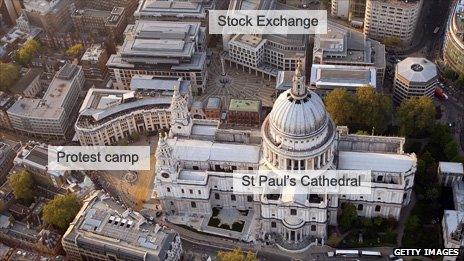Occupy London: St Paul's Cathedral faces closure threat
- Published
St Paul's Cathedral could be forced to close by the presence of activists in the churchyard staging an anti-capitalist protest, officials say.
The increased "scale and nature of the protest camp" since Saturday had forced the authorities to review its policy of remaining open, a spokesman said.
The activists are said to be from the Occupy London Stock Exchange movement.
An increase in their numbers was now posing "a risk to the life of the cathedral", the statement said.
The protest has been inspired by the Occupy Wall Street movement in New York, and there have been similar rallies in cities around the world.
'Time to leave?'
On Sunday the cathedral's canon chancellor, the Reverend Giles Fraser, said he had asked for the police presence outside the building to be scaled back.
"There was a line of police who were kindly trying to protect the cathedral, but I thought that was unnecessary, so we brought them down," he said.
Some activists said they planned to stay for several weeks, to demonstrate against what they have described as corporate greed in the City.
But the cathedral has now said the increase in numbers at the site meant it was forced to "review the extent to which it can remain open for the many thousands coming this week as worshippers, visitors and in school parties".
The statement asked: "Is it now time for the protest camp to leave?
The Canon of St Paul's Cathedral, the Reverend Giles Fraser, said he stopped police trying to move demonstrators on
"The consequences of a decision to close St Paul's cannot be taken lightly."
Last year the cathedral said it generated £8.25m from commercial activities, external, or an average of £22,600 a day.
This total included entrance fees from 820,000 paying visitors.
One of the supporters of the camp, Ronan McNern, has been talking almost daily to the church authorities and said the two sides were "working on addressing" the issue.
"There is also talk of having a whole-day benefit for the church, to both increase awareness of their financial situation and the fact they are unfunded," said the 36-year-old from south London.
"We could potentially raise some money for them."
Another protester, Peter, 24, from Hackney, in east London, who would not give his surname, said the camp had "really flourished since Saturday".
Benefits questioned
"We've seen many new tents erected. We've seen new lectures every day on economics and politics. We've now got an open free library. We've got a fully functioning kitchen."
"We're always in constant dialogue with the church and we have been since day one."
"We're working together to try and ensure all our interests are met and we're not negatively impacting on the church. That's not our protest and not what it's about."
London & Partners, the tourist organisation formerly known as Visit London, said St Paul's was among the UK's 10 most popular attractions and relied on visitors for "a large amount of their funding".
"We do hope that demonstrators will work with the cathedral team to ensure it can remain open for worshippers, visitors and schools," a spokesman said.
"These types of peaceful protests have been taking place across the world and this is not an issue isolated only to London.
"Other global cities such as New York, Frankfurt, Boston, Madrid, Los Angeles and Chicago have also seen these types of demonstrations but everyday life, work and tourism carries on as usual."
Meanwhile in the Commons, the Conservative MP for Harrow East, Bob Blackman, called for benefits to be stripped from protesters.
While defending the right to demonstrate peacefully, he said: "The growing encampment outside St Paul's Cathedral - it has residents that clearly are not available for work nor should they be eligible for state benefits."

- Published17 October 2011
- Published17 October 2011
- Published16 October 2011
- Published16 October 2011
- Published16 October 2011
- Published15 October 2011
- Published4 March 2011